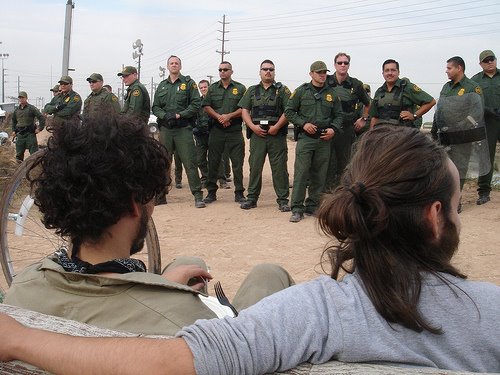by Denis Wagner
The Arizona Republic
NOGALES, Ariz. - Undocumented immigrants who decide to leave the United States because of increasing enforcement and decreasing job prospects now face one more obstacle: the threat of arrest and deportation by border officers inspecting outbound traffic.
When illegal immigrants are detected trying to leave the country, they are not just ushered across the line, said Bonnie Arellano, a spokeswoman for U.S. Customs and Border Protection. Instead, their information is entered into a database before they are allowed to return to Mexico.
Arellano and Guadalupe Ramirez, director at the Nogales port, said the objective is not to deter illegal immigrants who want to leave America but to catch those who have criminal records or are involved in smuggling. For the past year, officials have been conducting round-the-clock screening of southbound traffic. The scrutiny is designed to catch smugglers delivering currency and firearms to Mexican cartels but also has helped identify immigrants heading south.
"The whole idea is there are going to be consequences now for people who come into the United States with the sole purpose of doing illegal activity," Ramirez said. "Our job tells us if we find somebody at a port coming or going that is in violation of our laws, we are going to document it."
Making climate unfriendly
Since April, when Gov. Jan Brewer signed Arizona's new immigration law, illegal immigrants have been leaving the state. Some are moving to other states and some are moving back to Mexico. Supporters of the law say that's the point: to make the climate in Arizona so unfriendly that illegal immigrants deport themselves.
Last week, U.S. District Judge Susan Bolton blocked key provisions from taking effect, including one that compelled officers engaged in a lawful stop, detention or arrest to, when practicable, ask about a person's legal status when reasonable suspicion exists that the person is in the U.S. illegally.
Although immigrants with otherwise clean records sometimes get caught on their way out of the country, Ramirez said, port inspectors use discretion in deciding whether to formally remove someone. Photos and fingerprints are entered into a database before the person is returned to Mexico, or the person is officially arrested and deported. The consequences of an arrest can be harsh: Those formally deported for unauthorized presence in the United States may be barred for 10 years from seeking legal-immigration papers. In addition, a later arrest for illegal entry may be prosecuted criminally.
During the past 10 months, Arellano said, inspectors in Arizona alone detained more than 5,000 people attempting to leave the country. That number includes those caught with contraband or wanted on warrants, she said, but CBP data does not indicate how many had no violation other than their illegal presence in the United States.
Some immigrant advocates say the CBP policy deters illegal immigrants from leaving the country, even though that's supposed to be the government's goal.
"It demonstrates the inconsistency and contradictions within our laws," said Isabel Garcia, co-chair of Derechos Humanos, an immigrant-rights group in Tucson. "Instead of permitting people who want to leave, we punish them in this fashion. . . . What purpose does this serve?"
Garcia said she believes the objective is to bolster CBP arrest statistics: "It's all about the numbers."
'Safe passage' urged
Even some groups dedicated to border security and immigration controls are critical of the federal policy. William Gheen, president of Americans for Legal Immigration, last week called on the government to adopt a "safe passage" program allowing undocumented immigrants to depart without negative consequences.
"We are asking the Obama administration to designate border checkpoints that illegal immigrants can use to leave the U.S. without fear," he said. "This is about the only situation we would ever advocate that our immigration laws be waived."
Until last year, the government only sporadically checked vehicles and pedestrians leaving the United States at all Mexican land ports. However, the Obama administration, in an effort to intercept weapons and cartel money, set up full-time checkpoints with barricades on southbound lanes.
Ramirez said the campaign has exceeded expectations in Arizona. Since September, inspectors have seized $4.7 million in southbound cash on the Arizona border ($7 million borderwide), and more than 12,000 rounds of ammunition on the Arizona border.
"On a weekly basis, we make multiple seizures and pick up people who have warrants for rape, child molestation and murder," Ramirez said. He said inspectors, often supported by dogs trained to detect money and firearms, study southbound travelers for body language and bags, as well as other hints of lawbreaking.
"It really comes down to the officers' intuition. How good are your officers' gut feelings?" Ramirez said. "We're looking for the needle in the haystack - the bad guys who mix in with the good guys."
Read more: http://www.azcentral.com/news/articles/2010/08/03/20100803illegal-immigrants-leaving-U.S.html#ixzz0vlqoAxTY

No comments:
Post a Comment